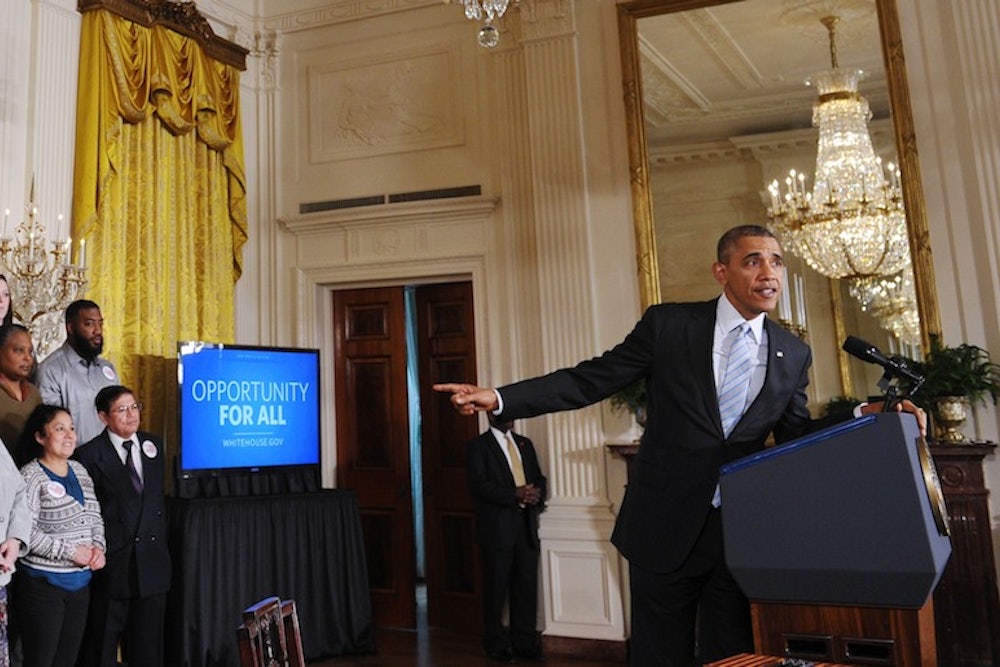The Congressional Budget Office just threw a hand grenade into the debate over the minimum wage. A new report released Tuesday argues that a higher minimum wage, which has become a centerpiece of President Obama’s agenda for combating economic inequality, will cost jobs. What lessons should we take from this report?
COSTS
Let’s start with the headline number. According to the CBO, a $10.10 minimum wage will cost 500,000 jobs. (The report also says the total could range between slight losses to one million.) It also concludes that a $9 minimum wage would cost 100,000 jobs, while saying that this number could range from a slight increase to 200,000 jobs. This estimate involves no original research by the CBO. What they did is a survey of the various economic research that already exist, picking an impact that the office’s staffers thought was appropriate.
As it turned out, what they thought was appropriate involved a lot of adjustments in the direction for a higher impact. In the report, the authors themselves clarify that they are taking a more conservative line. All predictions, of course, amount to speculation of things that could happen in the economy, but in this one the speculating goes in a direction that is, to a surprising extent, in tune with Republican ideology.
The report speculates that a minimum wage indexed to inflation would reduce jobs. It speculates that the speed of the minimum wage increase, or its level using various inflation measures, would reduce jobs. It argues job losses will be higher because of very new research centered on growth levels, even though that research is highly controversial. It speculates that technological change is coming faster than expected, and this will have an impact. And it also, crucially, speculates that these would bite much harder at $10 minimum wage instead of a $9 one.
These are all interesting ideas, but they are definitely putting a thumb on the scale towards an estimate of job losses that is, as Harvard University’s Lawrence Katz told me, “higher than the consensus.” The CBO, in effect, is trying to referee a debate among economists, but the report doesn’t quite convey the level of debate and the ambiguity when it comes to these numbers. Instead, it gives a narrow, and headline grabbing, result.
People should understand that these numbers involved picking an estimate that was high and too specific given the economic debates.
BENEFITS
Less headline-grabbing: The report also notes that the benefits of a wage hike are real, and substantial. 900,000 people would be lifted out of poverty. Ninety percent of the benefits in wage increases would go to those making less than six times the poverty level, with a solid concentration for those who make less than three times the poverty wages. And 16.5 million workers would see a pay bump at a new $10.10 minimum wage, with an additional 8 million experiencing a “ripple” raise above that rate. Conservatives will argue that it is poorly targeted overall towards the poor, regardless of the poverty reduction numbers, but it is substantially well targeted to those over the poverty line who are still not middle-class. Indeed, only 11 percent of the beneficiaries are teenagers.
According to Arindrajit Dube, an expert on minimum wages, the 900,000 may even underplay the benefits. “The CBO’s estimate is influenced by an over-reliance on simulation work, which underplays the actual, historical poverty reduction we see.” Dube notes that the historical work would be more in the several several million range. He also notes that many economists believe that poverty wouldn’t be impacted at all, or would even increase, so this is a major break with some conservatives economists.
So the CBO’s methodology is weighed to overstate the impact of a $10.10 minimum wage on jobs, while also understating the benefits. Even then there’s a clear tradeoff - a minor fall in jobs for serious real gains again inequality and wage security. Never mind the scary headlines, or the report that unfortunately plays to them: When you consider that the academy is far more ambiguous about the costs of giving the country a raise, and more bullish on the benefits, this is still an excellent deal for working Americans.
